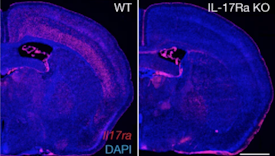
Jun Huh, Ph.D.
Assistant Professor, Harvard Medical School
SFARI Investigator, SFARI Scientific Review Board WebsiteJun Huh is interested in understanding the contribution of gut-residing bacteria and immune cells in the context of neurodevelopmental disorders. Huh and his colleagues have previously discovered a critical pathway linking gut bacterial species to an inflammatory cascade in pregnant mice that ultimately leads to behavioral abnormalities in their offspring, including deficits in social behaviors and increases in repetitive behaviors (Kim et al., Nature, 2017). In particular, they identified a specific T helper immune cell type (T helper 17, TH17 cells) and its secreted protein (interleukin-17a, IL-17a) as direct mediators of inflammation-induced neurodevelopmental disorder-like phenotypes. They have also found disorganized cortical brain development in the affected mouse offspring likely due to increased receptor activity for IL-17a. This work was one of the first studies to describe a mechanistic pathway linking the gut-immune-brain axis.
Ongoing work in the Huh lab focuses on suppressive roles of human-derived bacteria, upon introduction into mice, in mitigating inflammatory TH17 cell responses in pregnant mothers as well as in preventing the development of behavioral abnormalities and brain pathologies in their offspring.


